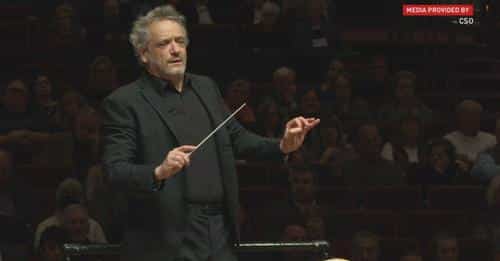British arts go into reverse
NewsThe National Theatre has just announced it will ‘reduce activity’ over the next four years due to ‘financial challenges’.
English National Opera is on its final year of funding.
The BBC Singers have been abolished.
Britten Sinfonia has launched a £1 million appeal to enable it to survive Arts Council cuts.
A quarter of the seats in BBC orchestras are to be unwaged.
Cities the size of Liverpool, Norwich and Southampton have been left without opera.
The post-1945 English artistic renaissance has gone into abrupt reverse, without much political debate.
Darkness descends.
Discuss.






If people want the government to step in then fine; but please identify where you want the money to come from (i.e. either by increased taxation or cuts to other things). Private sponsorship might in theory be an answer, but large corporations are busy pouring their spare money into diversity and inclusion projects because that is what they consider is expected of them.
A major issue for the UK at the moment is that there simply isn’t enough cash to go around – everyone in the public sector wants a pay rise; the armed forces and schools are underfunded; the NHS is a cash black hole; the welfare bill will only continue to rise. We all want more money for the arts, but unfortunately “we” are not (generally) representative of other peoples’ priorities. As far as I’m aware, no one has ever suggested adding a penny on income tax to provide more money for the arts.
And I repeat the point that the BBC cannot argue that it is cash-strapped whilst continuing to pay Gary Lineker £1.35m per year to front a football highlights programme.
Cut HS2.
Cut Trident.
Stop giving blank cheques to Zelensky, big pharma, the military-industrial establishment, and big energy companies (it is absurd that the government chose to use taxpayers’ money to cover the difference between Ofgem’s energy price cap and the government’s energy price guarantee… instead, the government should have legislated for a change in the methodology for calculating the energy price cap to limit inflation, and compelled the big energy companies, who are doing very well financially, to “take the hit”, just as the French government placed a cap on the level of increase in energy bills levied by EDF within France).
Leave NATO (or at least hold a referendum on NATO membership and the expensive commitments it entails… we got a referendum on EU membership, so why not a referendum on NATO membership?).
Reduce each MP’s salary to the upper-quartile FTE (full-time equivalent) income in his/her constituency (this would give MPs a very strong incentive to make efforts to improve the prosperity of the local area they represent, and deter people from going into politics for the money), and close loopholes in his/her allowances to ensure that they reflect only /bona fide/ expenditure incurred in the course of his/her parliamentary duties.
Clamp down on tax avoidance by major multinational firms such as Amazon, Apple, &c.
Why did this get so many times down? Great ideas!
Is this a ghost letter writer for Putin?
The Creative Sector is the second largest part of the UK economy. These flag ship institutions are essential in order to provide opportunities for the musicians, actors, technicians and others who work on the films, computer games , graphics etc. Allowing the arts to die is not only bad for the nation’s well being, it’s monumentally irresponsible in terms of the hit to the economy which will ensue.
Of course, I could also point out that Brexit has already profoundly damaged UK Arts and is costing the economy £100 billion a year. Maybe reversing that would provide the money we need for all those other things you mention.
Brexit is being stymied by bad-faith EU directives. If Brussels were to grow up and stop sulking it might be better for everyone concerned.
“but unfortunately “we” are not (generally) representative of other peoples’ priorities.”
Very true.
To a large extent, other peoples’ priorities have been shaped by our education system.
Simplistic rants against the current Government, and “big-this big-that” are not the answer. Nobody comes out of this very well – not the BBC, the education system, successive governments, you name it.
Well said Giles
All true. All acts of vandalism. All championed by a philistine and vindictive government that can find £5bn down the back of the sofa to kill people. All enabled by online bloggers who excoriate the BBC at every opportunity and stoke the culture wars for clicks.
Interesting about the National Theatre. Is there anything to stop them exploring more commercial/joint projects to balance some of their other works?
For example, why hasn’t their recent production of Follies opened on Broadway? Last year’s My Fair Lady came over from the Lincoln Center.
On the plus side many away from the UK are getting a free comedy show of cynical proportions.
Calm down – it’s just as ridiculous everywhere else. People in large numbers nearly always turns things into folly. Nationality has little to do with it.
Yes, without any real debate and without any rationale that stands up to the barest scrutiny. In terms of bringing art to less well served places, for example, which was a supposed motive, Glyndebourne and Welsh Opera touring have lost the funding that helped them take live opera across the country, ad have Britten Sinfonia, who brought high quality concerts and educational work into the rural county of Norfolk.
R.I.P.
Unfortunately, this state of affairs comes as no great surprise to me. The UK is becoming a cultural wilderness, for many. The poor provision of music and the arts, in state schools, has become a perennial problem. Now professional arts groups are lacking support, not helped by the implications of Brexit. We can only hope that this trend is reversed, before we lose yet another high quality product from these shores.
Welcome to America! Many of us retired or gainfully employed folks, actually pay to play here. Like it or not, it’s considered recreational.
These groups have over-relied on the vagaries of government support for far too long – it’s dangerous and it’s lazy. Make your own way – Learn how to fundraise and be the captain of your own ship.
Yes, let’s reduce massively all public subsidies to the arts, especially classical music, and leave behind the cultural traditions of wicked Europe. Just look at how unsuccessful and economically woeful their economies are. I say – let’s go for unashamed elitism and arts only for the toffs! Tally- ho chaps!
From America, it does seem clear the UK has slowly been shifting to our “wash your own face” model – for years now. To quote a fellow citizen above, the arts are viewed as “recreational” in America. And hence we have grotesque Broadway where a work of art is valuable if it runs to The Herd for over 5 years only. I’m sorry, English friends. I fear Capitalism is the true greedy evil here.
Nope, Germany is a capitalist country as well. Just not Manchester capitalism, or Reagan-Thatcher capitalism, but a well regulated capitalism. And funding for the arts is a constitutional duty for local, state, and federal government alike. Works rather well.
Germany is gearing up for cuts now, Darlink. You are not far behind, just further behind. Capitalism will slowly turn all arts to profit. Hallo! All German houses of theatre and opera are shaking with fear for what is already changing.
I don’t know. I think capitalism is guilty, only in so far as it helps to promote ‘popular culture’ to the masses. There’s a higher profit margin to be made with popular culture. Perhaps we’re saying the same thing. Regardless, I like to say that popular culture is neither.